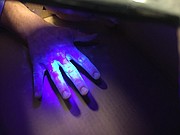Students learn the importance of properly washing their hands
Infection control specialists from Mineral Community Hospital visited Superior Elementary School on Thursday for handwashing demonstrations.
They will be visiting all three Mineral County Schools to teach students the importance of properly washing their hands.
The program began with a talk to the students in grades kindergarten through third grade about steps they can take to avoid getting sick and spreading germs to others. The experts explained that many diseases and conditions are spread by not properly washing hands with soap and clean running water.
This is the second year that the program had visited younger students and explained the importance of proper hygiene with the hopes that class room environment will be healthier. First the students are taught how to properly wash their hands:
They they line up by the sink and one by one wet their hands with running water, whether it’s warm or cold, turn off the tap and apply soap. Then lather their hands by rubbing them together with the soap, making sure to lather the backs of their hands, between their fingers and under their fingernails. Scrub for at least 20 seconds, then rinse with water.
The students then rub their hands with a special lotion and let it dry. The lotion represents germs, and under a special black light, they could see how much of the germs were actually washed off.
Several were amazed at how many “germs” were left on their hands and went back to the sink to try again. Germs can be transferred to other objects like handrails, table tops, toys and to other people’s hands. By removing germs through handwashing it can help prevent diarrhea, respiratory infections and may even help prevent skin and eye infections.
According to the Centers for Disease Control, “It’s important to teach people about handwashing. It helps them and their communities stay healthy.” According to the CDC website, handwashing education in the community reduces the number of people who get sick with diarrhea by 31 percent, reduces diarrheal illness in people with weakened immune systems by 58 percent and reduces respiratory illnesses, like colds, in the general population by 16 to 21 percent.



